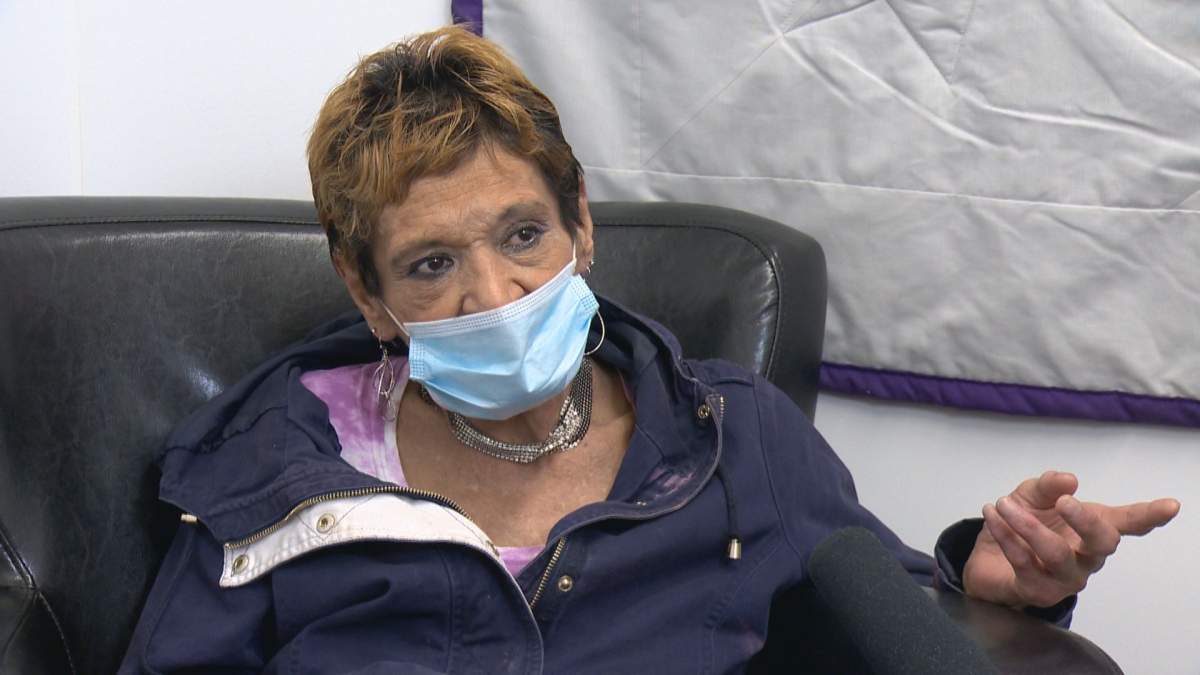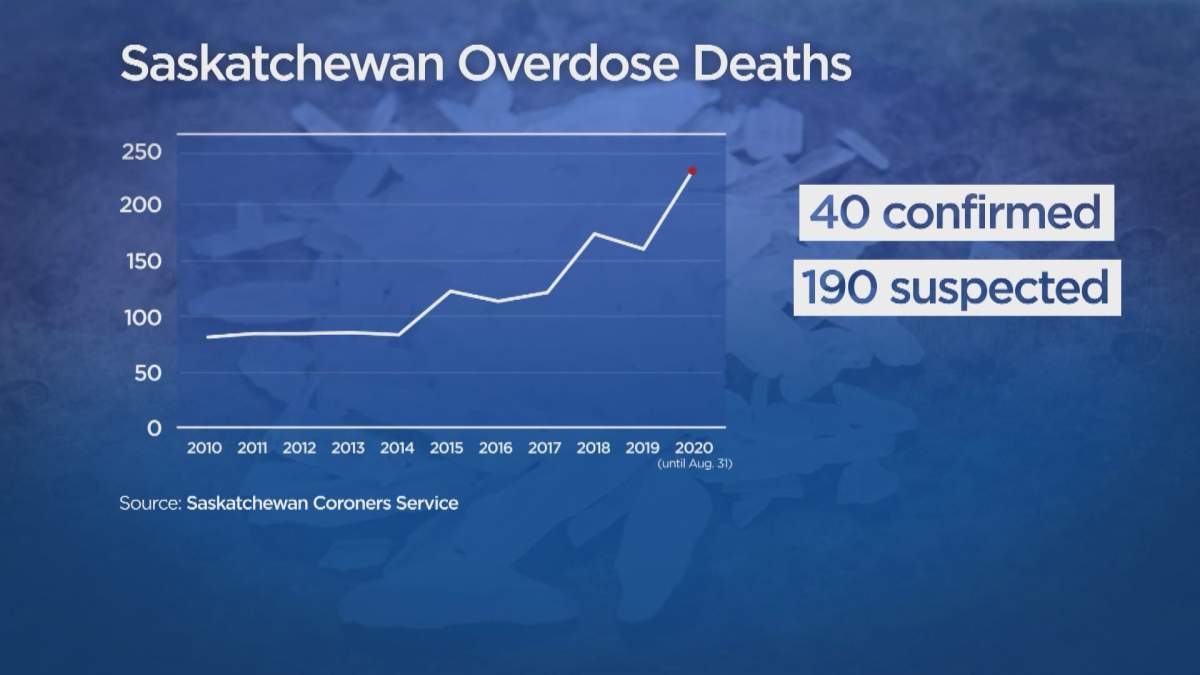Alice Dumais has seen two people overdose in the span of a week.

She said community members revived them with naloxone, but she has friends and family members who met a much darker fate.
“I beg some of them not to do (drugs) and I ask them if they realize that people are dropping like flies,” the Saskatoon woman told Global News in an interview.
Drug overdose deaths in Saskatchewan have nearly tripled since 2010, when 78 people died.
In the first eight months of the year, the Saskatchewan Coroners Service recorded 40 confirmed and 190 suspected overdose deaths, for a combined total of 230 deaths. There were 158 deaths in 2019 and 171 deaths in 2018.
Dumais said this year’s statistics scare her.
“I think, ‘Oh my God, that could’ve been me. Oh my God, that could’ve been my kid,’” she said.
Overdose response ‘a joke’
Harm reduction professionals say the COVID-19 pandemic has made a bad situation worse.
Jason Mercredi, executive director for Prairie Harm Reduction (PHR), said the drug supply was disrupted when international borders closed. Since then, he said much of the supply has been tainted.
“Really, it doesn’t matter what street drug people think they’re doing. The likelihood is fentanyl is in there,” Mercredi said.
PHR clients worry about their safety, he said.
“They’re saying that one day they talk to somebody and the next day, they’re dead,” he said.
“We only think that’s going to get worse with winter.”
He characterizes the province’s current approach to overdoses as “a joke.”
Dumais echoed that concern, saying it’s up to the province to prevent more deaths, but the current government isn’t doing enough.

Get weekly health news
She said she’s recovering from crystal meth and cocaine addictions, which is particularly challenging because she’s homeless.
“I wish that they would go ahead and do what they promise to do — to help people any way they can,” she said.
Whatever party is elected must invest in affordable housing and harm prevention, she said.
What politicians are saying
Since the writs were drawn up on Sept. 29, the leaders of Saskatchewan’s two most prominent political parties have discussed the crisis while on the campaign trail, saying things that have already been said: the situation is dire and something needs to be done about it.
On Thursday morning, nine days into campaigning, the Saskatchewan NDP announced something new — a $2-million commitment to develop a strategy for opioid and crystal meth misuse. It will prioritize prevention and access to treatment.
“We do need to make investments now to make sure that people are able to seek help,” NDP Saskatoon-Fairview candidate Vicki Mowat said in an interview on Tuesday. “They can’t seek help if they’re not alive.”
The NDP’s announcement is a good first step, Mercredi said, as a coordinated plan is needed to address the deteriorating addictions situation.
“We look forward to hearing from all provincial parties their planned investments for the next four years to proactively address the 230 overdose deaths that have affected families and communities across the province in 2020 alone,” he told Global News in a statement.
The Saskatchewan Party has not made any robust platform announcements about addictions response.
Party leader Scott Moe has been questioned extensively on why Saskatchewan’s first supervised consumption site was denied funding in the latest provincial budget. He has said the decision was based on budget priorities.
Last week, Saskatchewan NDP leader Ryan Meili said an NDP government would finance the site. Moe has not committed to doing the same, but hasn’t ruled out the possibility of funding the facility in the future.
Moe has repeatedly touted his government’s previous spending on addictions and mental health, including on a crystal meth treatment centre in Estevan.
“This is a challenge that is occurring across the nation,” Moe said at a campaign event on Tuesday. “But it’s one that, most certainly, we are committed to continuing to fund and continuing to manage with outcomes in mind.”
A Sask Party spokesperson did not respond to a request for comment on whether the party will announce new addictions funding commitments before election day on Oct. 26.
‘We’re looking for concrete steps’
Mercredi said he’s tired of hearing about previous spending.
“We’re looking for concrete steps,” he said. “We’re not looking for past investments or maybes for the future.”
The province has offloaded responsibility onto front-line workers, Mercredi said.
“Sending first responders out literally should be our last resort, but it seems to be our first line of defence,” he said.
As of Sunday morning, the Regina Police Service said there have been 830 overdose calls in the city this year.
In Saskatoon, Medavie Health Services West said it responded to 100 overdoses from July 27 to Aug. 3.
Emergency service providers in Saskatchewan take different approaches to publicly reporting overdoses, and Mercredi said a more cohesive system is needed.
He wants the publicly funded Saskatchewan Health Authority (SHA) to release weekly reports on drug trends and overdoses.
“Anything is better than nothing,” he said.
“Basically, we’ve got to track them down and shame them publicly into addressing this issue, which is pathetic.”
The SHA has restricted public communications during the writ period and did not respond to a request for comment.
Are you or someone you know struggling with addiction? Here’s a list of resources you can use to get help.
- A list of addiction services in different communities is available here.
- To find a Narcotics Anonymous meeting in Central Saskatchewan, click here.
- To find a local Alcoholics Anonymous group, click here.
- The province’s healthline is available 24-7 at 811 or 1-877-800-0002.
- The problem gambling helpline is available 24-7 at 1-800-306-6789.











Comments
Want to discuss? Please read our Commenting Policy first.